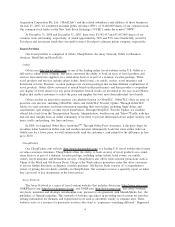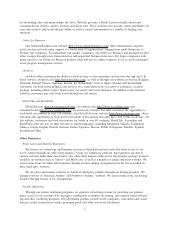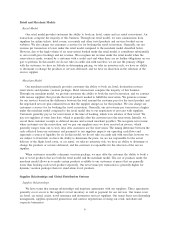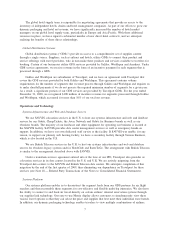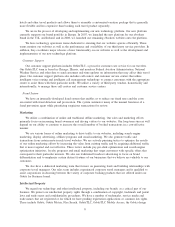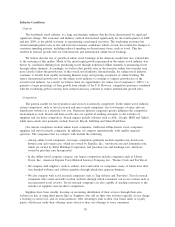Orbitz 2009 Annual Report Download - page 14
Download and view the complete annual report
Please find page 14 of the 2009 Orbitz annual report below. You can navigate through the pages in the report by either clicking on the pages listed below, or by using the keyword search tool below to find specific information within the annual report.Our revenue is derived from the travel industry and a prolonged substantial decrease in travel volume,
particularly air travel, as well as other industry trends, could adversely affect our business, financial
condition and results of operations.
Our revenue is derived from the worldwide travel industry. As a result, our revenue is directly related to
the overall level of travel activity, particularly air travel volume, and is therefore significantly impacted by
declines in or disruptions to travel in the U.S., Europe and the Asia Pacific region, which are our key regions,
due to factors entirely outside of our control. These factors include:
• general economic conditions, particularly the current economic downturn which has caused a decline in
travel volume;
• global security issues, political instability, acts or threats of terrorism, hostilities or war and other
political issues that could adversely affect travel volume in our key regions;
• epidemics or pandemics;
• natural disasters, such as hurricanes and earthquakes;
• the financial condition of suppliers, including the airline and hotel industry, and the impact of their
financial condition on the cost and availability of air travel and hotel rooms;
• changes to regulations governing the airline and travel industry;
• fuel prices;
• work stoppages or labor unrest at any of the major airlines or airports;
• increased airport security that could reduce the convenience of air travel;
• travelers’ perceptions of the occurrence of travel related accidents or the scope, severity and timing of
the other factors described above; and
• changes in occupancy and room rates achieved by hotels.
If there is a prolonged substantial decrease in travel volumes, particularly air travel and hotel stays, for
these or any other reasons, it would have an adverse impact on our business, financial condition and results of
operations.
We carry significant goodwill and indefinite-lived intangible assets on our consolidated balance sheet, and if
a future impairment were to occur based on a decline in our stock price, projected results of operations,
cash flows from operations or otherwise, we may be required to record a significant charge against
earnings.
During the year ended December 31, 2008, in response to changes in the economic environment and the
prolonged decline in our market capitalization, we recorded a non-cash impairment charge of $210 million
related to our goodwill and $74 million related to our indefinite-lived intangible assets. As of December 31,
2008, after giving effect to this impairment charge, we had goodwill and indefinite-lived intangible assets of
$1,181 million, which represented approximately 74% of our total consolidated assets. Under generally
accepted accounting principles, goodwill and indefinite-lived intangible assets must be tested for impairment
annually or more often if events or changes in circumstances indicate a potential impairment may exist.
Factors that could indicate that our goodwill or indefinite-lived intangible assets may be impaired include a
prolonged decline in our stock price and market capitalization, lower than projected operating results and cash
flows and slower growth rates in our industry. Due to the current economic uncertainty and other factors, we
cannot predict whether our goodwill and indefinite-lived intangible assets will be further impaired in future
periods or whether a significant charge against our earnings may be required, which could be higher than the
charge recorded during fiscal year 2008. If we are required to record an impairment charge for our goodwill
and indefinite-lived intangible assets in the future, this would adversely impact our results of operations.
14


